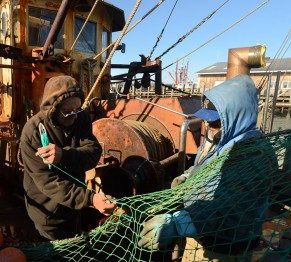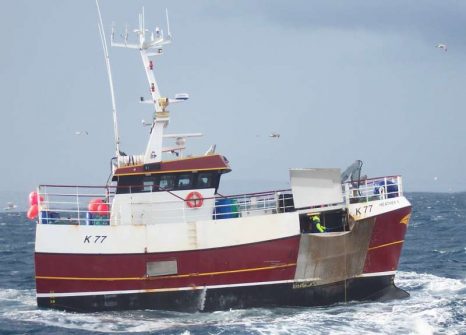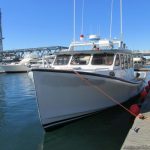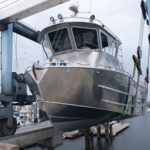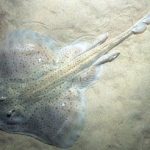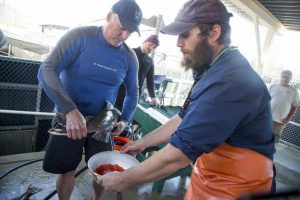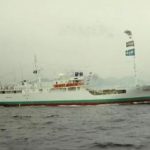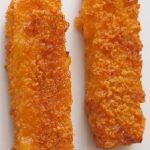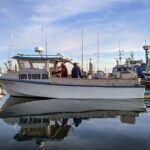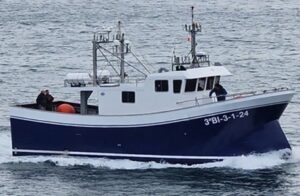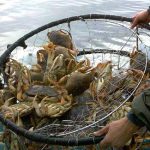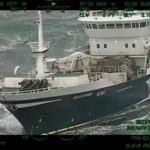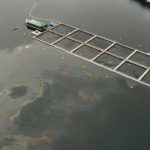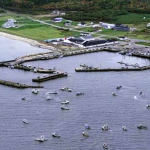Monthly Archives: August 2017
Time is running out to protect the Atlantic coast
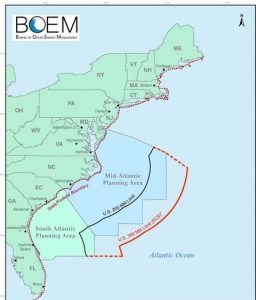 President Trump has proclaimed that his administration is seeking “American energy dominance.” The reality is we’re already there. The United States produces more natural gas and oil than any other nation. We do import about 25 percent of our oil needs mostly from Canada and Mexico. However, that’s only because we export about 1 million gallons a week of the type of domestically produced oil we don’t want. The U.S. is beholding to no other country for our energy security. If these facts come as a surprise to you, then you are ripe for being deceived by those who want to use airgun blasting to explore for oil and gas off the Atlantic Coast. The petroleum industry and its allies are trying to convince you that current technology and procedures for testing for offshore oil and gas deposits are safe. click here to read the story 09:13
President Trump has proclaimed that his administration is seeking “American energy dominance.” The reality is we’re already there. The United States produces more natural gas and oil than any other nation. We do import about 25 percent of our oil needs mostly from Canada and Mexico. However, that’s only because we export about 1 million gallons a week of the type of domestically produced oil we don’t want. The U.S. is beholding to no other country for our energy security. If these facts come as a surprise to you, then you are ripe for being deceived by those who want to use airgun blasting to explore for oil and gas off the Atlantic Coast. The petroleum industry and its allies are trying to convince you that current technology and procedures for testing for offshore oil and gas deposits are safe. click here to read the story 09:13
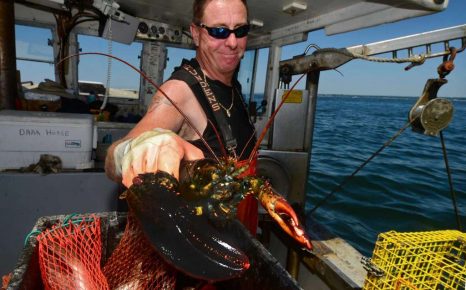
L.I. Sound lobstermen avoid regulatory pincers
Lobstermen working Long Island Sound dodged new limits on their fishery last week when federal regulators failed to adopt restrictions aimed at reversing a decades-long decline in the lobster population. An arm of the Atlantic States Marine Fisheries Commission voted down additional management measures, including a reduction in the size of lobster that could be harvested and a shorter season. “We are ecstatic,” said Mike Kalaman, a Norwalk lobstermen who believes the population is returning on its own, thanks to cleaner water and natural cycles. “We keep telling them that what’s in place is working,” Kalaman said. “If it’s not broke, don’t fix it. It’s fixing itself.” The decision by the American Lobster Management Board to defeat fishing restrictions was unusual; the board almost always adopts new management measures. The proposal on the table, developed by experts after months of research and deliberation, failed after numerous votes by a divided board. click here to read the story 08:20
RI And MA Lobstermen At Odds With Regulators Over Conservation Efforts – click here to read the story
Crab bill strengthening the Pacific Northwest’s Dungeness crab industry heads to President Trump
 A bill introduced by Oregon’s Sens. Ron Wyden and Jeff Merkley to strengthen Oregon’s crab fishery passed the United States Senate and will now head to the president’s desk for signature into law. The bill permanently extends a decades-long fishery management agreement that has been vital to the Pacific Northwest’s Dungeness crab fishery.,,, The states of Oregon, Washington, and California cooperatively manage the West Coast crab fishery in federal waters under a tri-state agreement that Congress first authorized in 1998. The act would make that authority permanent. click here to read the story 15:51
A bill introduced by Oregon’s Sens. Ron Wyden and Jeff Merkley to strengthen Oregon’s crab fishery passed the United States Senate and will now head to the president’s desk for signature into law. The bill permanently extends a decades-long fishery management agreement that has been vital to the Pacific Northwest’s Dungeness crab fishery.,,, The states of Oregon, Washington, and California cooperatively manage the West Coast crab fishery in federal waters under a tri-state agreement that Congress first authorized in 1998. The act would make that authority permanent. click here to read the story 15:51
FISH-NL: Canada’s fishery reputation was shot long before the death of 10 right whales
 The Federation of Independent Sea Harvesters of Newfoundland and Labrador (FISH-NL) says federal Fisheries and Oceans Minister Dominic LeBlanc’s has some explaining to do regarding his statement that the recent death of right whales in the Gulf of St. Lawrence pose a threat to Canada’s reputation. “Is that the same fisheries reputation that boasts the 25-year anniversary of the ’92 northern cod moratorium, and the same reputation that has most commercial fish stocks today off the province’s shores at or near critical levels?” asks Ryan Cleary, President of FISH-NL. “What an insult to Newfoundland and Labrador and the management crisis that has tightened its grip on our fishery for 25 years. The minister may not know it, but the embarrassing state of the Grand Banks has tarnished Canada’s fisheries reputation for decades.” click here to read the press release 14:05
The Federation of Independent Sea Harvesters of Newfoundland and Labrador (FISH-NL) says federal Fisheries and Oceans Minister Dominic LeBlanc’s has some explaining to do regarding his statement that the recent death of right whales in the Gulf of St. Lawrence pose a threat to Canada’s reputation. “Is that the same fisheries reputation that boasts the 25-year anniversary of the ’92 northern cod moratorium, and the same reputation that has most commercial fish stocks today off the province’s shores at or near critical levels?” asks Ryan Cleary, President of FISH-NL. “What an insult to Newfoundland and Labrador and the management crisis that has tightened its grip on our fishery for 25 years. The minister may not know it, but the embarrassing state of the Grand Banks has tarnished Canada’s fisheries reputation for decades.” click here to read the press release 14:05
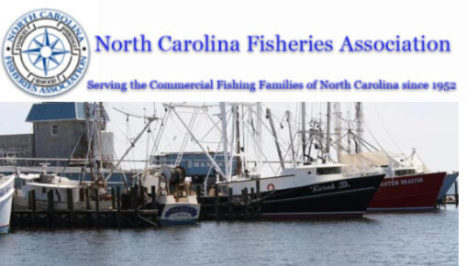
North Carolina Fisheries Association Weekly Update for August 4, 2017
Click here to read the Weekly Update, to read all the updates, Click here “If I don’t go, I’ll wish I had. If I do go, I’ll wonder why I went”. 13:45
The American Fisheries Advisory Committee Act: S-1322 – Sam Parisi, Gloucester
Last year I served on a panel to review applicants for S-K Grant money in Saint Petersburg,  along with ten other experienced fisherman thru out the USA. After two days of reviews we graded those and our mission was done. We had no idea who was awarded the grant money at the end of the two days. After a month the ones that were chosen were published. I notice one recipient from the East Coast was awarded $375,000 dollars yet I never saw come before the panel. I called the head man in Saint Pete and ask why I never saw it, and he said it was on a different panel. I was on both panels and it never came up. I believe that NOAA decides who gets the funds and the panel is there to appease the public. A Senator from Alaska heard my story and told me he was putting in a bill to go back to an advisory panel like it had in 1954. Bear in mind, this a year in the making and he asked for my help by contacting our Politian’s in the North East which I did. Two days ago Commerce Department approved his bill S-1322. The vote was 26 to one. What this means is NOAA will no longer receive the SKG money. A panel will be chosen by the Secretary of Commerce. Perhaps our fisherman will now see some of this money. Thank You, Sam Parisi, Gloucester Mass. click here to read the bill Commerce Approves Eight Bills and 10 Nominees – click here Thank you, Sam! 10:46
along with ten other experienced fisherman thru out the USA. After two days of reviews we graded those and our mission was done. We had no idea who was awarded the grant money at the end of the two days. After a month the ones that were chosen were published. I notice one recipient from the East Coast was awarded $375,000 dollars yet I never saw come before the panel. I called the head man in Saint Pete and ask why I never saw it, and he said it was on a different panel. I was on both panels and it never came up. I believe that NOAA decides who gets the funds and the panel is there to appease the public. A Senator from Alaska heard my story and told me he was putting in a bill to go back to an advisory panel like it had in 1954. Bear in mind, this a year in the making and he asked for my help by contacting our Politian’s in the North East which I did. Two days ago Commerce Department approved his bill S-1322. The vote was 26 to one. What this means is NOAA will no longer receive the SKG money. A panel will be chosen by the Secretary of Commerce. Perhaps our fisherman will now see some of this money. Thank You, Sam Parisi, Gloucester Mass. click here to read the bill Commerce Approves Eight Bills and 10 Nominees – click here Thank you, Sam! 10:46
NOAA seeks jurisdiction of Lake Michigan waters next to Wisconsin – Protecting shipwrecks or shipwrecking the economy?
 The National Oceanic and Atmospheric Administration (NOAA) is preparing to designate the waters of Lake Michigan next to Manitowoc, Sheboygan, and Ozaukee counties as a national marine sanctuary, and that has set off a howl of protest that the state is surrendering its jurisdictional authority to the federal government, which critics say could threaten commercial fishing and coastal recreational activities, among other things. Meanwhile, both the Trump administration and Congress are looking into the national marine sanctuary program and into what some say are its overreaching and unilateral power to impose restrictions in the sanctuary areas. click here to read the story 09:41
The National Oceanic and Atmospheric Administration (NOAA) is preparing to designate the waters of Lake Michigan next to Manitowoc, Sheboygan, and Ozaukee counties as a national marine sanctuary, and that has set off a howl of protest that the state is surrendering its jurisdictional authority to the federal government, which critics say could threaten commercial fishing and coastal recreational activities, among other things. Meanwhile, both the Trump administration and Congress are looking into the national marine sanctuary program and into what some say are its overreaching and unilateral power to impose restrictions in the sanctuary areas. click here to read the story 09:41
St. Anthony harvesters told they can’t keep their crab
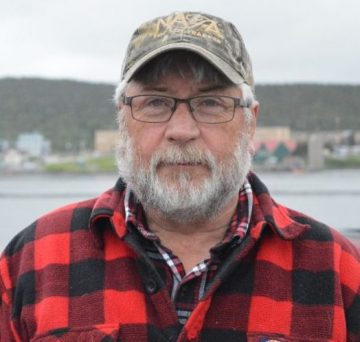 Frustrated crab fishermen gathered outside the Department of Fisheries and Oceans (DFO) office in St. Anthony early Wednesday morning. While the crab fishery officially ended on July 30, many harvesters left their final pots of the season in the water until now because of rough weather conditions. Late Tuesday evening, however, fishermen received calls that due to the delay in taking up their pots, any crab caught would have to be thrown back in the ocean. It was the cause of mass frustration that sent over 18 harvesters outside the DFO office the following morning.,,“They’re saying we got to throw away the crab, the crab that were starving for,” said Alyward. “Everybody out there got a couple thousand dollars of bait in those pots, and now we have to throw it all away. It’s pretty sick, that’s what I call that.” click here to read the story 09:10
Frustrated crab fishermen gathered outside the Department of Fisheries and Oceans (DFO) office in St. Anthony early Wednesday morning. While the crab fishery officially ended on July 30, many harvesters left their final pots of the season in the water until now because of rough weather conditions. Late Tuesday evening, however, fishermen received calls that due to the delay in taking up their pots, any crab caught would have to be thrown back in the ocean. It was the cause of mass frustration that sent over 18 harvesters outside the DFO office the following morning.,,“They’re saying we got to throw away the crab, the crab that were starving for,” said Alyward. “Everybody out there got a couple thousand dollars of bait in those pots, and now we have to throw it all away. It’s pretty sick, that’s what I call that.” click here to read the story 09:10
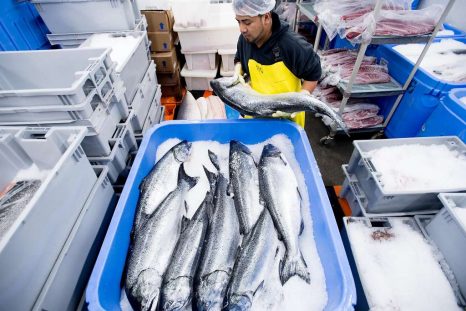
Commercial salmon season finally arrives in the Bay Area
At Monterey Fish Market on Pier 33, one San Francisco fisherman alone brought in 300 pounds of salmon on Tuesday, the first day of the Bay Area commercial salmon season. That haul was, in co-owner Tom Worthington’s words, a good omen for the much-delayed start of the season. Yet it’s still too early to say what the rest of the season, which wraps up Sept. 30, will bring.,,, According to Larry Collins of the San Francisco Community Fishing Association, the larger fishing boats he works with report getting 20 to 50 medium-size fish a day. Most boats won’t come back for a few more days, so salmon probably won’t start showing up in the markets until the weekend. Those on the water reported calm seas and low winds. click here to read the story 08:23
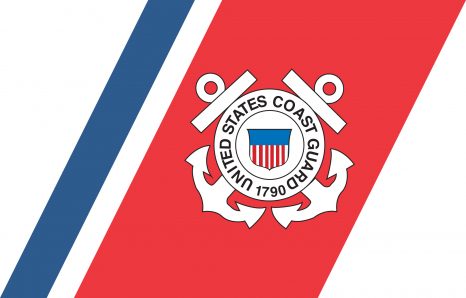
Happy Birthday to the United States Coast Guard! Created by Congress on 4 August 1790
The US Coast Guard turns 227 years old today — here are 34 jaw-dropping photos of the branch in action click here 07:48
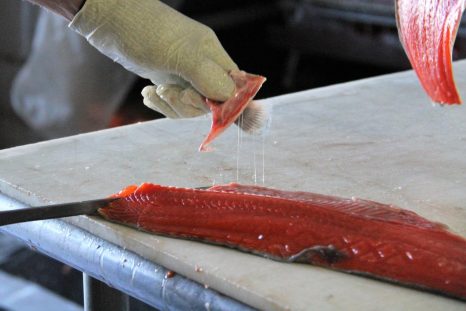
Wild Alaskan Salmon and Seafood: Quality over quantity
Wild Alaskan Salmon and Seafood is a family owned business, processing 25,000 pounds of salmon per day. Inside the plant 13 workers are hard at work. They work long hours, sometimes pulling 22 hour shifts, but morale is high, music is on and people are joking. James Sumrall, assistant manager, said everyone is friends. “When we come here being such a small and tight knit crew it’s kinda like we’re hanging out here. It’s steady and hard work but it’s kinda like we’re hanging out,” he said. “No type of overbearing hand that’s telling you work harder, work faster. Obviously we keep a good pace, but it’s a lot friendlier, moral stays high.” Wild Alaskan Salmon and Seafood is owned by Tony and Heather Woods. Most of the salmon processed at the facility is caught by drifter Tony himself. In fact, he was not available for an interview because he is out fishing the tail end of the season. Audio, click here to read the story 20:09
Dick Grachek: Maximum Sustainable Yield: Just More Management Delusion or a Bureaucratic Con?
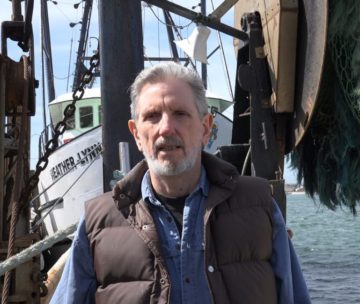 Even if getting out from under the management fantasy of the “extinction delusion” could somehow become a reality, an essential overhaul of the basic goals of fishery management is necessary and must begin by asking the obvious—but totally neglected—question, what exactly is all this management supposed to accomplish, anyway? Maximum Sustainable Yield: Stable and Sustainable Stocks, Right? Well…actually, managing the fisheries to MSY is all wrong. MSY accomplishes nothing more than stock population instability. One of the major mechanisms of this MSY approach is engineering the taking of large fish out of a population in some formulaic proportion to the young recruited into that particular stock. This is a naive and simplistic notion of stock dynamics. It completely ignores a myriad of natural or “biological-environmental” factors that govern fish survival and growth and population. Click here to read the story with a side note from Dick Grachek 17:04
Even if getting out from under the management fantasy of the “extinction delusion” could somehow become a reality, an essential overhaul of the basic goals of fishery management is necessary and must begin by asking the obvious—but totally neglected—question, what exactly is all this management supposed to accomplish, anyway? Maximum Sustainable Yield: Stable and Sustainable Stocks, Right? Well…actually, managing the fisheries to MSY is all wrong. MSY accomplishes nothing more than stock population instability. One of the major mechanisms of this MSY approach is engineering the taking of large fish out of a population in some formulaic proportion to the young recruited into that particular stock. This is a naive and simplistic notion of stock dynamics. It completely ignores a myriad of natural or “biological-environmental” factors that govern fish survival and growth and population. Click here to read the story with a side note from Dick Grachek 17:04
Poor common squid catches to continue in Japan
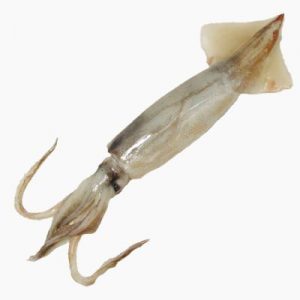 Poor catches of surume-ika, or Japanese common squid, are likely to continue this year. The squid is used in popular home dishes such as sashimi and is also sold in a form that is dried overnight. According to a long-term forecast about fishing conditions by the Japan Fisheries Research and Education Agency, arrivals of surume-ika squid to sea areas near Japan will likely be almost the same or lower compared with those in last year, when catch volumes of the squid were at a record low. Many fisheries experts share a view that the poor catches have been affected by decreases in the number of eggs the squid lay due to the decreasing sea water temperature in the East China Sea during recent years. click here to read the story 14:58
Poor catches of surume-ika, or Japanese common squid, are likely to continue this year. The squid is used in popular home dishes such as sashimi and is also sold in a form that is dried overnight. According to a long-term forecast about fishing conditions by the Japan Fisheries Research and Education Agency, arrivals of surume-ika squid to sea areas near Japan will likely be almost the same or lower compared with those in last year, when catch volumes of the squid were at a record low. Many fisheries experts share a view that the poor catches have been affected by decreases in the number of eggs the squid lay due to the decreasing sea water temperature in the East China Sea during recent years. click here to read the story 14:58
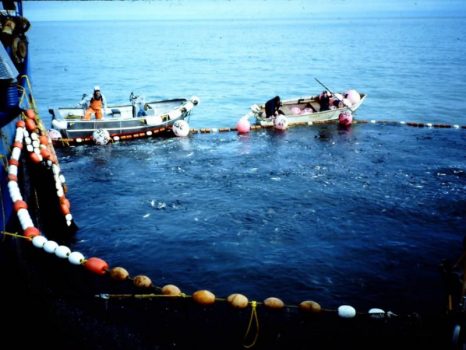
Togiak Sac Roe Herring: Catch the Story Before it’s Gone
My own visual memories of Togiak are not much more than a slate of wide, open grey sky that merged into open grey water. In the early 2000s, I flew out from Homer with a spotter pilot, landed on the beach in the community and then probably took a skiff from the beach to go out to meet my dad’s boat, F/V Agave. At the time, I was certainly not taking notes or paying attention to location details but what I do remember is bleak, grey, bland, flat land. The landscape was nothing like the mountains in south central and south east Alaska, I just recall bleakness. I never had the opportunity to explore the magic features of seeking out glass floats washed from across the Pacific, looking for ivory, exploring the shorelines. I went out to simply fish and retrieve my own juvenile income, not to recall anything else. That was not enough to provide a credible nostalgia of what it was like to fish out there in the peak of the alluring, crazy, chaotic competition combined with a visual recollection of stoic, stark, rural Alaska. By Emilie Springer click here to read the story 14:25
All options to protect right whales ‘on the table,’ says Fisheries Minister Dominic LeBlanc
 The federal government will bring “absolutely every protection possible to bear” to prevent any further deaths of North Atlantic right whales in the Gulf of St. Lawrence, federal Fisheries Minister Dominic LeBlanc pledged on Thursday. His department is working closely with Transport Canada to address the “serious and troubling situation” and will provide whatever resources are necessary to protect the endangered species as well as the people who work near the whales, he said during a news conference in Moncton. The government is prepared to “take all necessary steps.” “Every option to protect right whales is on the table,” he said, citing changes to shipping lanes, surveillance flights or changes to fishing gear as being among the possibilities. click here to read the story 12:53
The federal government will bring “absolutely every protection possible to bear” to prevent any further deaths of North Atlantic right whales in the Gulf of St. Lawrence, federal Fisheries Minister Dominic LeBlanc pledged on Thursday. His department is working closely with Transport Canada to address the “serious and troubling situation” and will provide whatever resources are necessary to protect the endangered species as well as the people who work near the whales, he said during a news conference in Moncton. The government is prepared to “take all necessary steps.” “Every option to protect right whales is on the table,” he said, citing changes to shipping lanes, surveillance flights or changes to fishing gear as being among the possibilities. click here to read the story 12:53
LeBlanc vows to save ‘majestic’ whales after deadly summer – click here to read the story 15:20
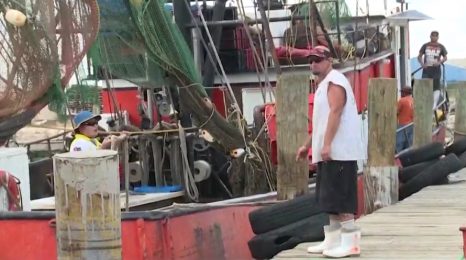
Texas shrimpers say Americans are quitting migrant jobs that are ‘too hard’
Brownsville – Americans taking jobs as shrimpers off the Texas coast are calling it quits, saying the job is just too tough. The jobs they’re quitting are usually filled by seasonal migrant workers, who some companies consider more reliable employees. Shrimping operators claim that federal policies are making it tough to hire more migrants and it’s leading to troubled waters. Some Texas shrimp boats are returning to shore after just two weeks at sea to unload freshly-caught shrimp and newly-hired shrimpers, like 46-year-old Paul Jones. “It’s back-breaking work man,” Jones admitted. “I have too much education for this.” The Mississippi native called it quits after just 17 days on the job. The boat he worked on, the Dorada Cruz, wasn’t supposed to return to shore until mid-August. “The people here, the American guys, you know why they’re not working? Because they feel the same way like I do,” Jones said. “It’s not worth it.” Video click here to read the story 12:33:40
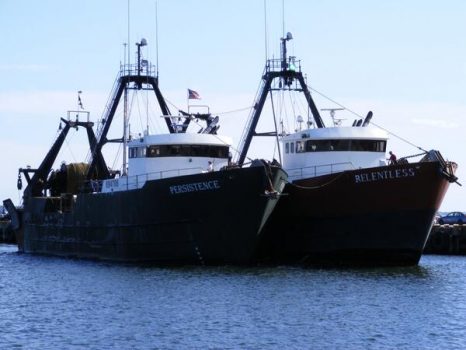
Always Top Quality! Your Seafreeze Ltd. Preferred Price List for August 3rd 2017 Has Arrived!
Contact our sales team today @ 401 295 2585 or 800 732 273 Click here for the complete price list from Seafreeze Ltd. – We are Direct to the Source-We are Fishermen-We are Seafreeze Ltd! Visit our website!11:08
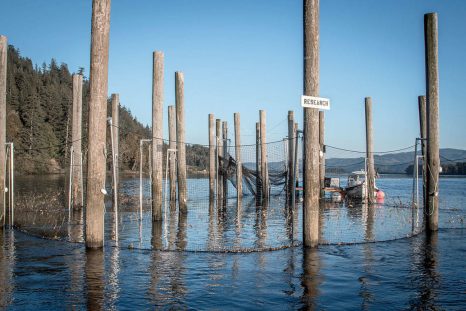
DFW proposes a test commercial fishery using fish traps in Willapa Bay
Fish traps, banned in Washington in 1934 for being so effective they were singled out as the major cause of salmon declines at the time, are now being eyed by the state Department of Fish and Wildlife and wild fish proponents as a tool to allow for commercial harvest of hatchery fish while decreasing the mortality of native salmon in Willapa Bay. “We were thinking, what kind of alternative fishing method should we be thinking about with the commercials,” said Annette Hoffman, Region 6 fish program manager. “We sent out a reminder (to commercial fishing about getting their ideas) in December 2016, got a number of ideas and pursued all those that met the criteria, and only one person followed through with the process and that was the fish trap.” click here to read the story 09:42
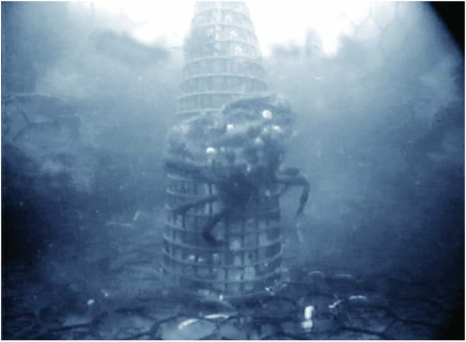
Crooks in a Crab Pot
Most people in the bays and estuaries of coastal South Jersey, including places such as Barnegat Bay, have concerns about someone stealing their crab pots or lifting the blue crabs in it. This applies to commercial fishermen as well as the recreational potters. What neither of these groups realizes is that there are probably thieves in their crab pots as well. And these thieves often go undetected even though they are stealing during the day and night and at all stages of the tide. These thieves are the ones that steal the bait from the crab pots. We learned about these thieves by placing a video camera in one of the mouths (tunnels) of a typical pot for blue crabs and dropping it into Willitt Creek with a feed that was attached to a monitor in my office. This approach allowed real-time observations and recording and also prevented me from getting a lot done when there was interesting behavior in the crab pot. click here to read the story 08:51
After falling to historic lows, Alaska commercial fishing deaths on the rise
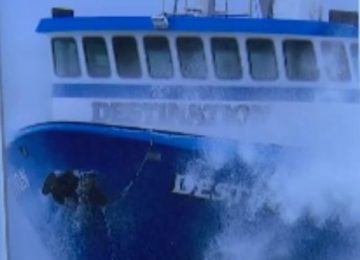 After a recent historic year of no recorded deaths in Alaska’s commercial fishing industry, fatalities in the sector known for its dangers have once again spiked. There have been 10 commercial fishing deaths in Alaska so far in 2017. A large portion of this year’s deaths were from the fishing vessel Destination, which sank in the Bering Sea just north of St. George Island in February. The six men on the boat were later legally declared dead. The other deaths were a man overboard on the fishing vessel Dances with Clams in the Copper River Delta in May, the June capsizing of the boat Miss Destinee in Marmot Bay off Kodiak Island which killed two, and a person overboard from the Lady Colleen in July in Ugashik Bay. This comes not long after the U.S. Coast Guard recorded the first year — measured from Oct. 1, 2014, through Sept. 30, 2015 — of zero operations-related deaths in Alaska’s commercial fishing industry. click here to read the story 07:58
After a recent historic year of no recorded deaths in Alaska’s commercial fishing industry, fatalities in the sector known for its dangers have once again spiked. There have been 10 commercial fishing deaths in Alaska so far in 2017. A large portion of this year’s deaths were from the fishing vessel Destination, which sank in the Bering Sea just north of St. George Island in February. The six men on the boat were later legally declared dead. The other deaths were a man overboard on the fishing vessel Dances with Clams in the Copper River Delta in May, the June capsizing of the boat Miss Destinee in Marmot Bay off Kodiak Island which killed two, and a person overboard from the Lady Colleen in July in Ugashik Bay. This comes not long after the U.S. Coast Guard recorded the first year — measured from Oct. 1, 2014, through Sept. 30, 2015 — of zero operations-related deaths in Alaska’s commercial fishing industry. click here to read the story 07:58
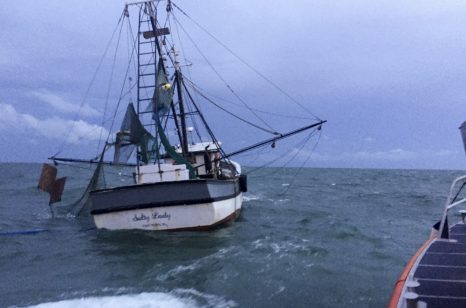
Coast Guard, Charlotte County Sheriff’s Office assist 3 fishermen sinking off Gasparilla Pass
The Coast Guard and Charlotte County Sheriff’s Office assisted three men Wednesday after their boat started sinking 4 miles west of Gasparilla Pass. Assisted were: Sherman Williams, 66 Frank Williams, 33 Justin Mahaffy, 31 Coast Guard Sector St. Petersburg watchstanders received a report at 6:28 p.m. Tuesday from the Charlotte County Dispatch stating three people aboard the Salty Lady, a 52-foot fishing boat, were taking on water and they were in need of emergency assistance 4 miles west of Gasparilla Pass. A 29-foot Response Boat-Medium (RBM) boat crew from Coast Guard Station Cortez and the crew aboard the Coast Guard Cutter Seahawk, an 87-foot Coastal Patrol Boat stationed at Sector St. Petersburg, launched to assist. A Charlotte County Sheriff’s Office marine unit crew arrived at 7:38 p.m and assisted with dewatering the boat. The boat crew aboard the Seahawk arrived at 8:22 p.m. and the RBM arrived at 10:12 p.m. to join the dewatering efforts.
At 1:19 a.m. Wednesday, the boat crews determined they were not able to keep up with the flooding to safely tow the Salty Lady crew. All three boaters were transferred to the RBM. The boaters were transported to Venice Inlet at 1:52 a.m. Wednesday where family members were waiting. No injuries were reported. The owner is making arrangements to have the Salty Lady towed to Boca Grande. 2 more images click -USCG- 21:11
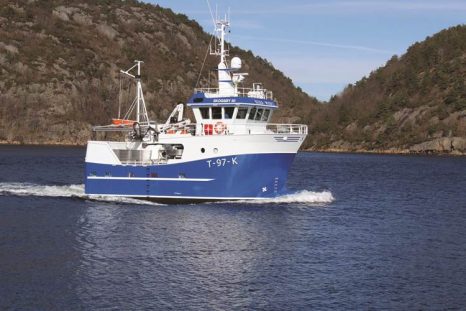
Playing Catch: Northern Europe Fisheries Fleet Review
Record hauls of wild fish, an unprecedented return on farmed salmon, finance and subsidy garner new orders, new designs and emboldened suppliers. In Scandinavia, particularly Norway, rich, carefully managed fisheries raise just one question for the commercially minded — which wave of business to ride. A growing number of large and small players are in on the action, as historic profits are heralded up and down the supply chain. For the hardened makers of gear that know tougher times, this is the golden age. “We’ve sold record numbers of net haulers to boats up to 50 foot,” says Hydema Syd stalwart Solbjoerg Solgaard. Sales to the U.S. are soaring, she says, and Canada has picked up, especially for automatic hauling equipment. 8 images, click here to read the story 20:29
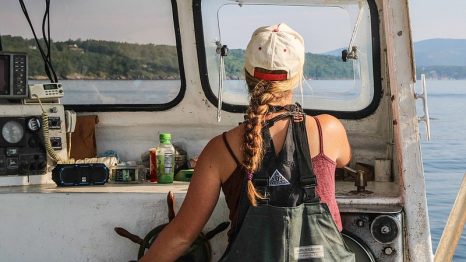
More Women Move Into Maine’s Rough And Risky World Of Lobstering
It’s 6 a.m. on a calm morning in Maine’s Rockport Harbor, and Sadie Samuels is loading traps from her pickup truck onto her 28-foot lobster boat. The daughter of a lobsterman, Samuels was born in a nearby hospital and has been on the water here for most of her 25 years. “I’ve been coming out fishing in this harbor since I was born. I came here before I went home from the hospital,” she says. “I had my first student license when I was 7.” Lobstering is physically demanding, dangerous work, and it has traditionally been considered a man’s job. But Maine’s lobster fleet has a growing number of women who, like Samuels, are running their own boats, and busting stereotypes along the way. In 2016, women held 434 of the 5,000-plus lobster licenses in Maine. Audio report, read the story here 19:36
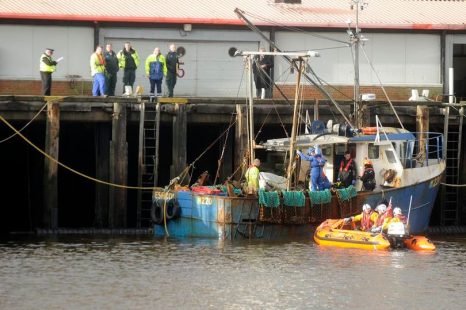
Boat owner jailed over fishermen’s deaths in Whitby
The owner of a boat on which two men died from carbon monoxide poisoning has been jailed for 15 months. Mark Arries, 26, from Blyth, and Edward Ide, 21, from Amble, died on the boat which was moored in Whitby harbour in January 2014. The pair were using a gas cooker to warm the boat overnight as they slept. Timothy Bowman-Davies had pleaded guilty to breaching safety laws but claimed he was not aware the men were using the cooker for heating. click here to read the story 17:42

Two topless women want you to think of them when you boil your lobsters
Two 20-something female volunteers stood topless, wilted and all red, their eyes closed, their arms and rubber lobster claw gloves hanging over the sides of a fake lobster pot — like cooked lobsters who had just been boiled to death. The front of the cloth pot, which had fake flames around the bottom, read, “Put yourself in their place.” Twenty-year-old Bangor native Bianca Giron and Mary Ann Persad, 25, of Brooklyn, New York, were volunteers through the People for Ethical Treatment of Animals (PETA) organization to oppose the boiling alive of millions of crustaceans every year. They had positioned themselves on the corner of Main and Park streets, near the entrance of the 70th annual Rockland Lobster Festival, which runs from Aug. 2 through Aug. 6. click here to read the story 16:42
Legislative Bills would open red snapper harvest out to at least 25 miles
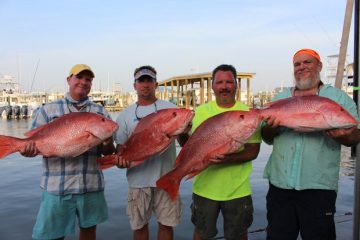 Louisiana senators and representatives have introduced companion legislation in Congress that would give states management authority of red snapper out to 25 miles or 25 fathoms, whichever is greater, off their coastlines. Currently, states control red snapper out to nine nautical miles. Both Louisiana senators, Bill Cassidy and John Kennedy, introduced the bill in the Senate, while Reps. Garret Graves, Cedric Richmond and Clay Higgins joined seven other representatives to propose the House bill. The legislation is designed to ensure Gulf of Mexico anglers have broader access to rebounding red snapper stocks during 2018 and beyond. This year, the Commerce Department gave recreational anglers 39 additional days in federal waters after NOAA Fisheries set a three-day recreational season. That move is being contested in court, and without legislation to address the issue, recreational anglers could be locked out of the fishery in 2018. click here to read the story 16:01
Louisiana senators and representatives have introduced companion legislation in Congress that would give states management authority of red snapper out to 25 miles or 25 fathoms, whichever is greater, off their coastlines. Currently, states control red snapper out to nine nautical miles. Both Louisiana senators, Bill Cassidy and John Kennedy, introduced the bill in the Senate, while Reps. Garret Graves, Cedric Richmond and Clay Higgins joined seven other representatives to propose the House bill. The legislation is designed to ensure Gulf of Mexico anglers have broader access to rebounding red snapper stocks during 2018 and beyond. This year, the Commerce Department gave recreational anglers 39 additional days in federal waters after NOAA Fisheries set a three-day recreational season. That move is being contested in court, and without legislation to address the issue, recreational anglers could be locked out of the fishery in 2018. click here to read the story 16:01
Former deep-water fisherman reveals the tough, basic and disciplined life he had at sea
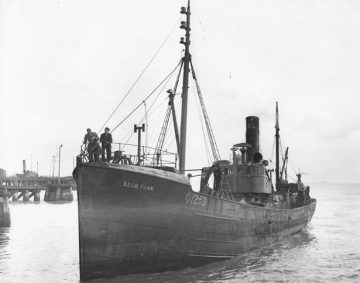 After my last trip on the Black Watch as relief bosun I found myself ashore with some time to myself for a change. However, like I thought, it was not long before offers of another ship came along, leaving me with some really good choices. Some of them I turned down for genuine reasons, like the Northern Crown, because that offer had come far too soon after my last voyage to Greenland, which would not have allowed me even 72 hours in dock. Also I had offers from the very first company that I’d ever sailed in when I left school at the tender age of 15. On that occasion I left school on Easter Friday and went to sea the following Tuesday aboard the Alfred Bannister owned coal burner Loch Park (GY 259). Life aboard those grand old ladies of the sea was so tough, basic and disciplined from the salty old characters who sailed in them, you just couldn’t help but learn the job pretty fast. Michael Sparkes click here to read the story 13:56
After my last trip on the Black Watch as relief bosun I found myself ashore with some time to myself for a change. However, like I thought, it was not long before offers of another ship came along, leaving me with some really good choices. Some of them I turned down for genuine reasons, like the Northern Crown, because that offer had come far too soon after my last voyage to Greenland, which would not have allowed me even 72 hours in dock. Also I had offers from the very first company that I’d ever sailed in when I left school at the tender age of 15. On that occasion I left school on Easter Friday and went to sea the following Tuesday aboard the Alfred Bannister owned coal burner Loch Park (GY 259). Life aboard those grand old ladies of the sea was so tough, basic and disciplined from the salty old characters who sailed in them, you just couldn’t help but learn the job pretty fast. Michael Sparkes click here to read the story 13:56
Athearn Marine Agency Boat of the Week: 38′ Young Bros. (Slippery 38) Lobster Boat, 6 Cylinder Cummins 6BTA Diesel
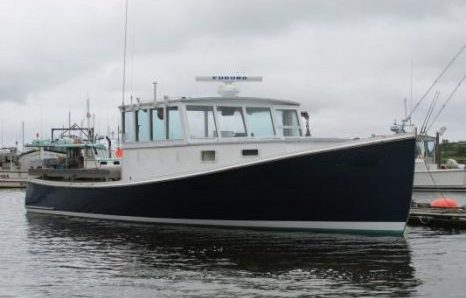 Specifications, information and 11 photos click here To see all the boats in this series, Click here 12:25
Specifications, information and 11 photos click here To see all the boats in this series, Click here 12:25






